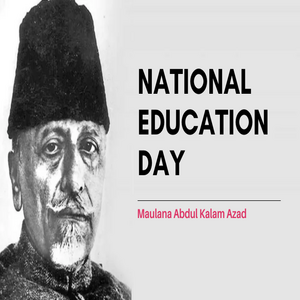National Education Day 2021: The New face of Indian Education System
 Celebrated every year on 11th November to honor the birth anniversary of India’s first education minister Maulana Abul Kalam Azad, the National Education Day has been announced as a day of national observance by the Ministry of Human Resource Development (MHRD). A freedom fighter and social reformer, Maulana Abul Kalam Azad served the nation between 1947 to 1958 as the first education minister under India’s first Prime Minister Pandit Jawaharlal Nehru’s government. As a scholar and an eminent educationist, Maulana Abul Kalam Azad was committed to building the nation through education and was seamlessly engaged in reforming the Indian Education system throughout his life.
Celebrated every year on 11th November to honor the birth anniversary of India’s first education minister Maulana Abul Kalam Azad, the National Education Day has been announced as a day of national observance by the Ministry of Human Resource Development (MHRD). A freedom fighter and social reformer, Maulana Abul Kalam Azad served the nation between 1947 to 1958 as the first education minister under India’s first Prime Minister Pandit Jawaharlal Nehru’s government. As a scholar and an eminent educationist, Maulana Abul Kalam Azad was committed to building the nation through education and was seamlessly engaged in reforming the Indian Education system throughout his life.
Remembering one of phenomenal freedom fighters of the country, who continued to fight the educational adversities faced by the common man after the independence of India to carve a better future for its upcoming generations, let us take a look at the ongoing trends influencing the Indian Education system.
Non-Conventional Courses
Indians have always remained confused about choosing the correct course to learn for the students. Although as a developing country, most of our graduates have remained fixated on becoming doctors, lawyers, accountants, and engineers, the present preferences of the students have been changing. With the introduction of variety of programs, which resulted in the initiation of novel market for other avenues. There are independent players, such as YouTubers and social media influencers who have managed to open up a unique set of opportunities itself, which were unimaginable earlier. At present, students are curious to explore new skills and vocational courses in areas relevant to Design thinking, Video Editing, Fashion, Marketing, PR, Communications, along with numerous niche fields such as Hospitality, e-commerce, Data Science, Food & Catering, Machine Learning, Artificial Intelligence, and Edu-Tech programs.
Virtual Learning
The arrival of COVID pandemic has compelled the students and educators to adopt online platforms for learning. With work from home settings, the professionals have also shown inquisitiveness to learn new things. Amidst the rising technological advancements, online education platforms along with online training courses and exams, are gradually becoming a common trend. As the virtual world of education slowly gaining pace, the online schooling is estimated to emerge as a USD 3 billion in India by 2022. We have been witnessing an apt blend of technology and education that has managed to forge an impeccable and personalised educational program from kindergarten to post-graduate students. Online schools and virtual learning trends are gradually gaining popularity as they intermingle conventional teaching with advanced technologies and digital learning resources.
Concept-Based learning
The journey towards digitization is encouraging concept-based learning, ultimately helping students to develop important skill sets and be equipped for their futuristic goals. With the trend in learning getting shifted from machines to cell phones, the fast rise in digitalisation in urban and rural areas are catalysing the pattern of learning almost everywhere. Owing to schemes like Digital India and AtmaNirbhar India initiative as well, the adoption of digitized learning is also accelerating and this has resulted in the emergence of concept-based learning as one of the foremost trends.
Artificial Intelligence (AI) as Evaluation Tool
AI-based programs provide valuable insights into the performance of students along with a better grasp over each topic/subject. In the traditional manual evaluation of the examination, there are chances of possible biases. This can be avoided by the implementation of Artificial Intelligence as a tool of evaluation. It can allow students to test their own results with awareness, resulting in the decrease of the risk of biases during evaluation
Transitioning through the age of digitization and technological advancements that have also significantly influenced our teaching and learning methodologies, the roots of our accomplishments trace back to the sturdy foundation laid by Maulana Abul Kalam Azad. We have come a long way since then, and India has not only improvised its education standard but has also upsurged as a premium destination for numerous students across the globe.

